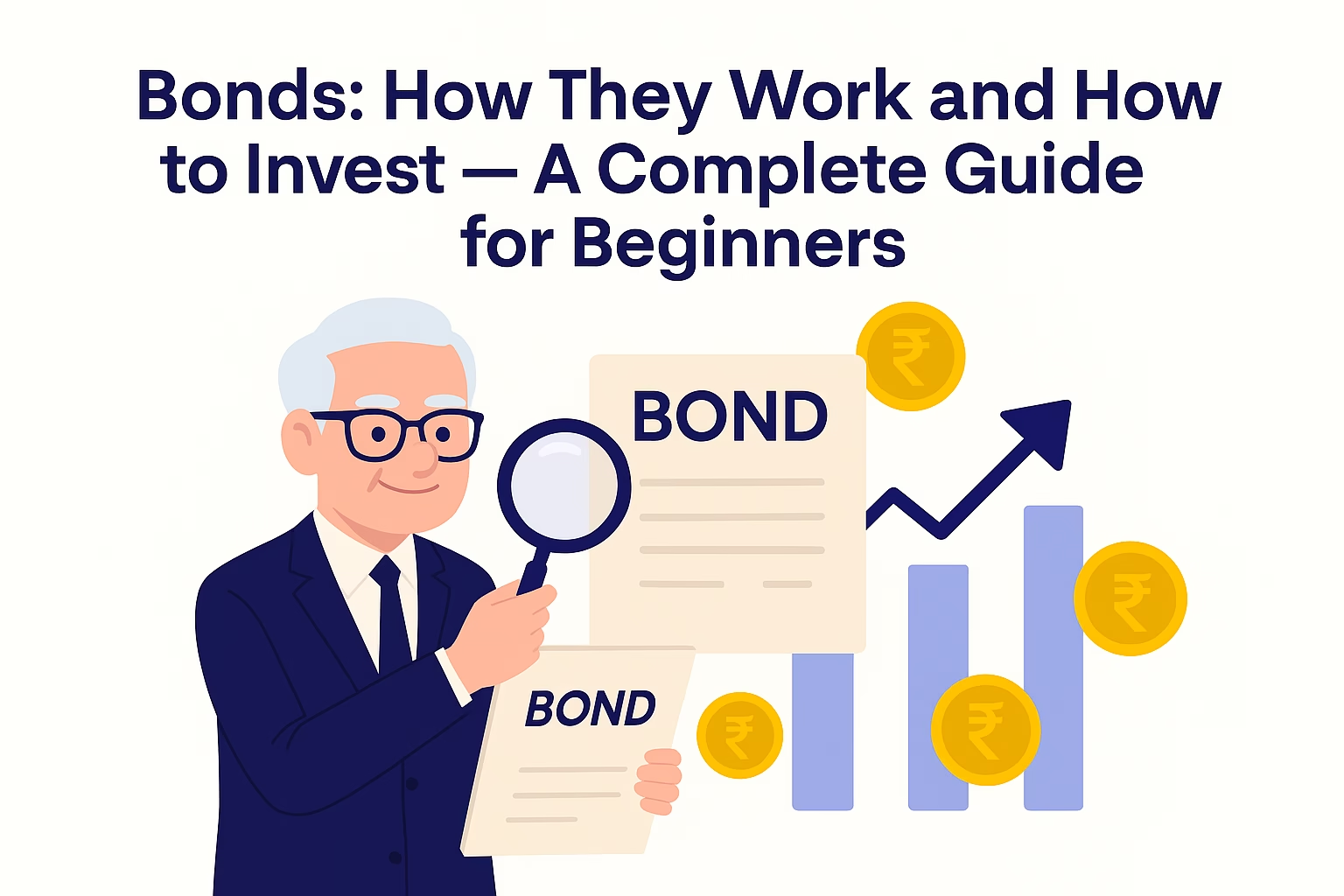If you are confused about how bonds work, is it safe to invest in it? If you think yes, then how and where to invest? A bond is a fixed income security and financial instrument that gives investors predictability and helps manage risk properly. Investors lend money to gthe overnment, corporations, and institutions for their operating expenses.
How does Bond work?
Bonds are fixed-income securities. Government and Private entities issue bonds to raise capital to fund their existing operations and upcoming projects.
Government and Private entities are issuers of the bonds, and individuals who invest in those bonds are known as bondholders.
Interest yield (Coupon rate) and maturity date are predetermined at the time of issue. Entities repay interest on the Face Value of the bond and the principal amount at the time of maturity.
Ex. 100 rupees bond has a coupon rate of 10% and a maturity of 2 years. The individual will receive 10 rupees per year for 2 years and 100 rupees at the end of the 2nd year.

Bond repayment sources
- National government bonds (sovereign bonds) are repaid by collecting taxes and sometimes printing money. These bonds are considered safest among all bonds and are used for comparison with other bonds. As it is considered safest, the risk is very low.
- Regional and local government bonds: repaid from collected fees from tolls, public transport and through local taxes. These bonds are considered riskier than national government bonds but safer than corporate bonds.
- Corporate bonds: use cash from their business operations to repay. Ex. sales, profit, etc.
- A. Secured Bonds – These bonds are backed by specific assets (ex., equipment, buildings). In case of bankruptcy, the investor can claim that asset. These bonds are used by companies with unstable or less cash flow to attract investors.
- B. Unsecured Bonds – These bonds are not backed by any specific asset because repayment only depends on the company’s ability to make money, usually issued by companies with strong finances.
- POV of investor: While investing, the investor should look at all factors, whether their investment is backed by any collateral, and usually gets lower interest or unsecured bonds with higher returns.

Seniority
In the event of bankruptcy of an entity or issuer, debt investor have the authority to claim the assets first above all equity investors. So they rank above all. Senior debt is higher in rank than junior debt, also known as subordinated debt. So, senior debt is considered less risky.
Frequency and Coupon Rate
Coupon is the interest you receive per period. When you invest in a bond, you receive a coupon on your face value of the bond.
Types of coupons
- Fixed-Coupon bond – The interest rate in these bonds is fixed, and the frequency means how often you receive that interest. Ex. Monthly – 12 times a year, Quarterly – Every 3 months = 4 times a year, Semi-Annually – Every 6 months, so 2 times a year, Annually – Once a year.
- Floating rate bonds (FRNs) – These bonds pay variable interest that changes over time. Payments in this type of bond are typically made quarterly or semi-annually. The coupon rates are based on:
- a. Market Reference Rate (MRR) – is a standard rate in the market, like LIBOR, MIBOR, SOFR. It keeps changing as the economy changes.
- b. Credit Spread – it is based on the credit risk of a company or government, a fixed extra percentage added to the MRR.
- Zero-Coupon Bonds (Discount Bonds) – This type of bond is offered at a discount, and the full value is paid at maturity. These bonds don’t pay interest regularly. The interest is paid only once, when the bond matures. In this type of bond, there is no payment frequency because it tends to get a lump sum at the end. Ex. invest 700 in a bond and get 1000 after 5 years, the extra 300 you receive is your total interest.
Why does frequency matter?
Frequency is one of the most important aspects in bonds, the more frequent payments means more regular cash flow for the investor. Less frequent payments might be beneficial for issuer but offer lower effective return for investor, investor tends to prefer semi-annually and quarterly bonds for balanced income.
Bond Covenants
Usually, bondholders don’t get voting rights like shareholders, so bond covenants are legally binding promises written into the bond agreement to protect bondholders, in which the company agrees to follow certain rules.
- Affirmative Covenants – The Company have to do certain things that are written in the rules, like share regular financial reports with bondholders, use the money for certain purposes like building a factory or allow a bondholder to sell their bonds early or at higher prices if the company is going into a merger or acquisition. Other important ex.
- a. Pari Passu Clause: This clause bonds are treated equally with other similar debts. There will be no unfair preference.
- b. Cross-Default Clause: If the company fails to pay any of the certain loans, it is also considered that they have failed this one too.
- Negative Covenants – This complies with the company, preventing it from doing risky things that might harm bondholders, like can’t take too much additional debt, can’t sell important assets, or paying big dividends that could affect the company’s finances.
Bonds are one of the most important types of raising money for companies, governments, and institutions. While bonds provide steady income and low-risk investment, they are also important for the country’s economy. That’s why it is very crucial for investors to understand how bonds work and learn about finance. We are here to help you with this great initiative. If you want any topic from us, please comment on our blog, and we will bring those topics to our blogs
